
Resources
Resources for Teachers
Teaching about Climate Change
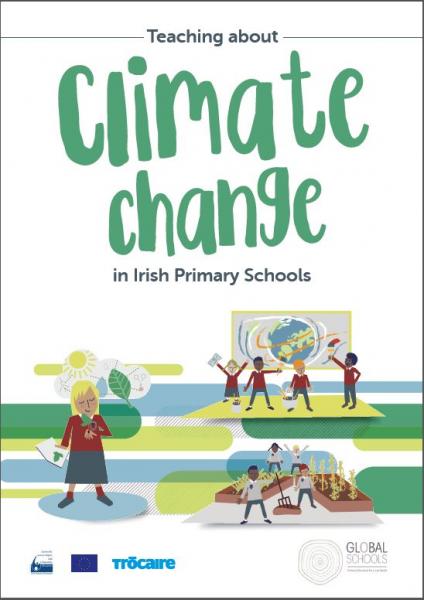 This resource is a useful and practical tool for educators and policy makers on climate change education that puts forward a whole school approach. It sets out some of the key elements of climate change education and offers practical tips and tools for teachers and schools. The resource is available here: Teaching About Climate Change.
This resource is a useful and practical tool for educators and policy makers on climate change education that puts forward a whole school approach. It sets out some of the key elements of climate change education and offers practical tips and tools for teachers and schools. The resource is available here: Teaching About Climate Change.
Age: 5-12 I Topics: Climate change education I Curriculum areas: whole school approach
Making Children's Rights Real
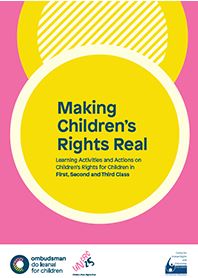 Making Children's Rights Real is a suite of resource materials to support teachers in primary and post-primary schools to explore children’s rights with their students in the context of curriculum teaching and learning. The materials include an important focus on supporting children and young people to implement an action for children’s rights. The resource is available online at https://www.oco.ie/childrens-rights/education-materials.
Making Children's Rights Real is a suite of resource materials to support teachers in primary and post-primary schools to explore children’s rights with their students in the context of curriculum teaching and learning. The materials include an important focus on supporting children and young people to implement an action for children’s rights. The resource is available online at https://www.oco.ie/childrens-rights/education-materials.
Age: 5-18 I Topics: Human Rights, Children's Rights, UN Convention on Rights of Child I Curriculum areas: Primary curriculum, CSPE, TY and Politics & Society
Just Children 1
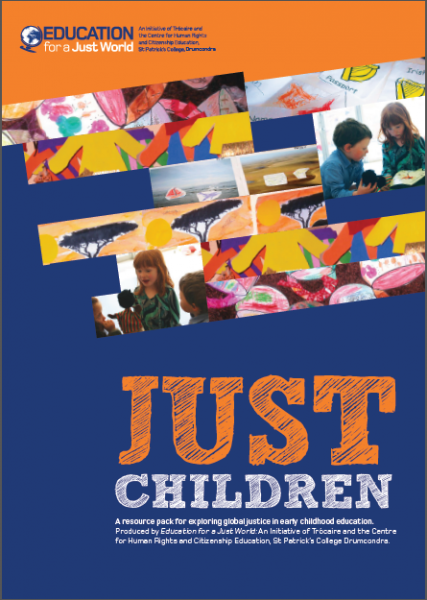 Just Children 1 comprises of a story sack and teaching resources to explore global justice issues with young children. The ideas and activities are based on research conducted with children and their teachers in pre-school and classroom settings. It is available to purchase through the Centre or by contacting Mary Boyce in Trócaire on 01-6293333. .
Just Children 1 comprises of a story sack and teaching resources to explore global justice issues with young children. The ideas and activities are based on research conducted with children and their teachers in pre-school and classroom settings. It is available to purchase through the Centre or by contacting Mary Boyce in Trócaire on 01-6293333. .
Age: 3-6 | Topics: fairness, interdependence | Curriculum areas: Aistear and the Primary School Curriculum
Just Children is a global citizenship education programme, using a story sack pack to support young children’s engagement with global justice issues. The Programme responds to research conducted with children aged three to six years. The Programme is designed to support pre-school and infant class teachers in exploring concepts such as: fairness, interdependence, near and far and similarity and difference, in a global context with young children. It promotes the development of key skills including empathy, critical thinking and communication.The story sack is built around the story of Mama Panya’s Pancakes. Set in Kenya, the picture book depicts the journey made by Adika and his mother to their local market. The activities and materials in the sack are linked to the early childhood education curriculum Aistearand the Primary School Curriculum. The materials include:
- Storybook: Mama Panya’s Pancakes
- Four Mama Panya’s Pancakes posters
- Eight photographs of Cecelia, depicting the daily life of young girl living in urban Kenya
- The Adika puppet
- CD of stories and music
- A programme presenting learning experiences linked with both Aistear and the Primary School Curriculum
Just Children 2
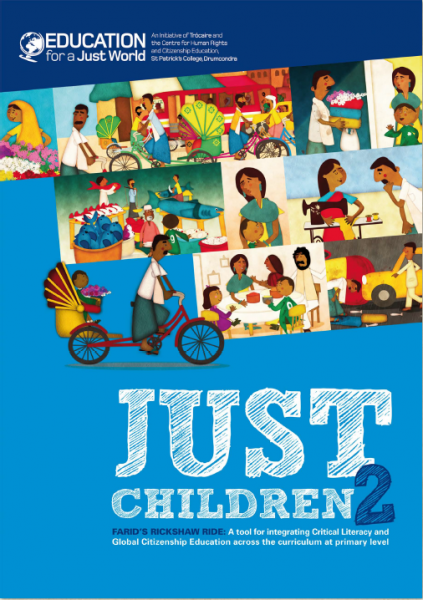 Just Children 2 is built around the Farid's Rickshaw Ride storybook. The resource responds to research exploring how children understand global justice issues and engage with critical literacy skills. It is available to purchase through the Centre or by contacting Mary Boyce in Trócaire on 01-6293333.
Just Children 2 is built around the Farid's Rickshaw Ride storybook. The resource responds to research exploring how children understand global justice issues and engage with critical literacy skills. It is available to purchase through the Centre or by contacting Mary Boyce in Trócaire on 01-6293333.
Age: 7-9 | Topics: Trade, Climate change, migration, human rights | Curriculum areas: cross-curricular
Just Children II, 2014, is a cross-curricular primary level programme built around the storybook, Farid’s Rickshaw Ride. The aim of the programme is to deepen children’s knowledge of Bangladesh, develop their understanding of global justice issues and encourage them to engage critically with different perspectives. The Programme is divided into nine sections where children review the settings, characters, plot, themes, and the motive for writing the story. There is a key question in each of the nine sections that provides a focus for class discussion.The programme responds to research exploring how children, aged seven to nine years, understand global justice issues and engage with critical literacy skills. Using a range of teaching and learning methodologies the programme encourages cooperative learning and the sharing of ideas between pupils. Children are encouraged to make personal connections and to extend their thinking about global issues and the images and texts they encounter.An Overview of the Just Children Programme
| Section | Outline | Key Question |
| 1. Settings | Children consider the settings shown in the storybook. How do the representations of Ireland compare to their own experiences of Ireland? What perspectives on Bangladesh are included? | Can photographs and pictures show what life is really like in a country? |
| 2. Characters | Children review the story’s characters and the different perspectives they provide. Using a maths and a giant footsteps activity they consider the characters in the context of the wider Bangladeshi population. | How do people’s lives, experiences and perspectives vary within a country and between countries? |
| 3. Plot | Children explore the story’s plot and consider different possible endings. | What are the causes and effects of events in the story? |
| 4. Motive | Children think about the purpose of the story and compare it to other writing on Bangladesh. | How do writers persuade us to see things their way? |
| 5. Theme: Trade | Children map where their food and clothes come from. Children think about conditions in clothes factories in Bangladesh and look at news articles related to the collapse of the clothes factory in Dhaka | Should we care how and where clothes are made? |
| 6. Theme: Climate Change | Children complete a mystery to see the connections between the burning of fossil fuels in Ireland and challenges facing people in Bangladesh as a result of climate change. Children compare fossil fuel use in different countries. | Is climate change fair? |
| 7. Theme: Migration | Children think about the reasons for migrating and empathise with people who move, reflecting on the challenges and benefits of moving | Why do people move? |
| 8. Theme: Human Rights | Children role-play the accident with the rickshaw and the car. They decide who caused the accident. They look at the rights in the Universal Declaration of Human Rights and defend Amal using these rights | What rights does everyone have? |
| 9. Children’s writing | Children use their learning from the programme to write their own compositions. Children share their compositions and question and comment on each other’s work. | How do others respond to my writing? |
Farid's Rickshaw Ride
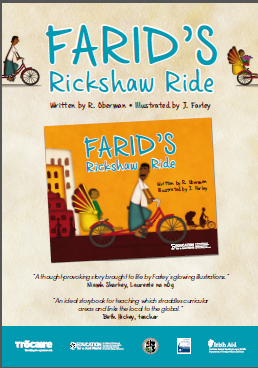 Farid's Rickshaw Ride is a beautifully written and illustrated picturebook that tells the story of a nine year old boy and a rickshaw driver from Bangladesh. Using illustrations, photographs and comic strips, the book provides opportunities for discussing issues of child voice, migration, trade, climate change and human rights. It is available to purchase through the Centre or by contacting Mary Boyce in Trócaire on 01-6293333.
Farid's Rickshaw Ride is a beautifully written and illustrated picturebook that tells the story of a nine year old boy and a rickshaw driver from Bangladesh. Using illustrations, photographs and comic strips, the book provides opportunities for discussing issues of child voice, migration, trade, climate change and human rights. It is available to purchase through the Centre or by contacting Mary Boyce in Trócaire on 01-6293333.
Age: Suitable for All | Topics: making connection, perspectives, climate change, migration | Curriculum areas: cross-curricular
Farid’s Rickshaw Ride, 2014, is a picture book for exploring issues of global interdependence and justice and for developing children’s critical literacies. The book tells the story of Farid, a nine year old boy living in Bangladesh. Farid embarks on a rickshaw journey around the city of Dhaka to collect flowers, fish and blankets in preparation for his cousin’s visit from Ireland. On the way, Amal, the rickshaw puller, shares some of his life experiences which expose Farid to different livelihoods inside and outside the city. An accident happens between the Rickshaw and a car which highlights issues of justice and vulnerability. The story explores links between Ireland and Bangladesh. Using illustrations, photographs and comic strips, the book provides opportunities for discussing issues of child voice, migration, trade, climate change and human rights.
Creating Futures
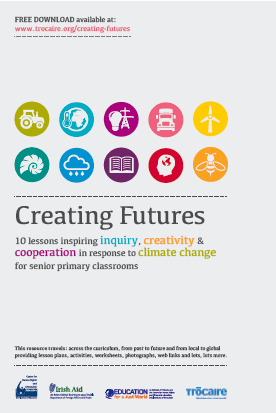 Creating Futures is a new, free and online resource for exploring climate change in senior primary classes. It is cross-curricular and contains 10 units with lesson plans and support materials such as photos, worksheets, games and more. To access the resource, please go to:https://www.trocaire.org/documents/creating-futures-resources/.
Creating Futures is a new, free and online resource for exploring climate change in senior primary classes. It is cross-curricular and contains 10 units with lesson plans and support materials such as photos, worksheets, games and more. To access the resource, please go to:https://www.trocaire.org/documents/creating-futures-resources/.
Age: 10-12 | Topics: climate change, climate justice, futures education | Curriculum areas: cross-curricular
Creating Futures, 2016 is a Programme for exploring climate change in senior primary classes. The Programme contains ten units with lesson plans and supporting materials including pictures, worksheets, web-links, games and lot lots more. The Programme explores the science of climate change, the consequences of climate change and responses to climate change. It is cross-curricular with lessons specifically linked to different national curriculum subject areas. It aims to support children developing a range of skills and concepts including inquiry thinking, communication, critical thinking and problem solving. Lessons inspire creativity, cooperation and debate and explore a range of themes including chronology, evidence, sustainability, global justice and leadership. The Programme consists of three sections.
- Greenhouses and Glaciers, Understanding the Science of Climate Change
- Explore weather and climate, collect weather data and design investigations
- Map the history of planet earth through photos to understand fossil fuels and the greenhouse effect
- Examine the evidence for climate change
- Factories, Fairness and Floods, the Causes and Consequences of Climate Change for People and Planet
- Grind the data on who causes climate change
- Rank different solutions to climate change
- Predict the consequences of climate change for nature and humans
- Discussing, Deciding and Designing, Exploring Responses to Climate Change
- Assess transport past and present and design your own for the future
- Role-play the oil dilemma
- Look at leaders and leadership
The Programme also contains a creative writing assessment and a short briefing on climate change for teachers.
Eco Detectives
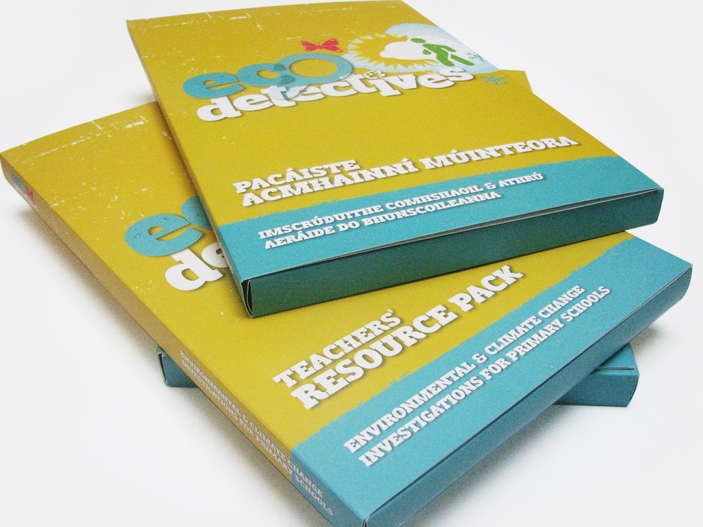 Eco Detectives is available in English and as Gaeilge and is presented across four units - from junior and senior infants through to 6th class. It includes creative ways to teach about climate change and is available free of charge and on-line from AskAboutIreland.ie
Eco Detectives is available in English and as Gaeilge and is presented across four units - from junior and senior infants through to 6th class. It includes creative ways to teach about climate change and is available free of charge and on-line from AskAboutIreland.ie
Age: Suitable for All | Topics: climate change| Curriculum areas: Geography, science, language, mathematics and SPHE
ECO DETECTIVES is a teacher resource pack comprising environmental and climate change investigations for primary schools, produced by the Department of the Environment, Heritage and Local Government as part of the CHANGE Campaign. The CHANGE Campaign is Ireland's national awareness campaign on climate change. To develop this resource, CHANGE partnered with the Centre for Human Rights and Citizenship Education, to ensure the resource is relevant for teachers and educationally sound. The resource is presented in four units: Junior and Senior Infants, 1st and 2nd Class, 3rd and 4th Class and 5th and 6th Class. This resource, available in Irish and English, draws together some of the most creative ways to teach about climate change, primarily through geography and science. It also enhances childrens’ learning in other curriculum areas, particularly language, mathematics and SPHE. Every primary school in the country has received a pack. The resource is
Looking Outside the Circle
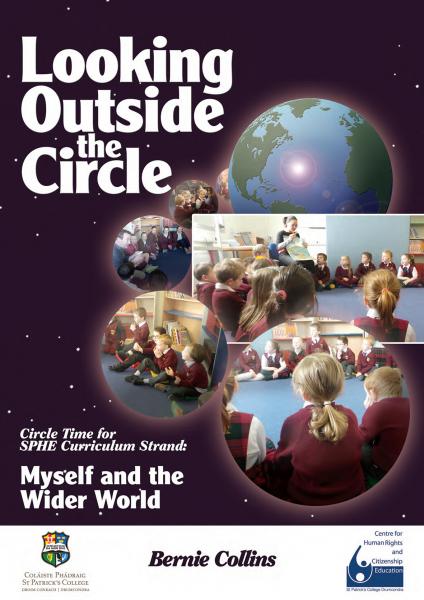 Looking Outside the Circle has been developed by a leading teacher educator in SPHE, Dr. Bernie Collins. It includes detailed lessons plans and innovative and fun activities for children. The resource encourages children to get involved in their local and global communities and to be proactive in upholding their own rights and the rights of others. It is available here.
Looking Outside the Circle has been developed by a leading teacher educator in SPHE, Dr. Bernie Collins. It includes detailed lessons plans and innovative and fun activities for children. The resource encourages children to get involved in their local and global communities and to be proactive in upholding their own rights and the rights of others. It is available here.
Age: Suitable for all | Topics: active citizenship, human rights, media literacy | Curriculum areas: SPHE
Looking Outside the Circle: Circle Time for SPHE Curriculum Strand Myself and the Wider World will tick all those boxes! This resource has been developing by a leading teacher educator in SPHE (Dr. Bernie Collins) and is practical and accessible to help you to develop children’s social, democratic and citizenship skills.
The resource at a glance:
- Detailed lesson plans for all class levels in Irish primary schools from Infants to 6th Class
- Covers all the content objectives in the Wider World strand of the SPHE Curriculum
- Innovative and fun activities for children
- Activity sheets and other original resources for each class level
- Is the first Irish circle time resource which is directly linked to Irish curricula – but the materials be adapted for any classroom situation even if children are not in a circle.
In an increasingly globalised world Looking Outside the Circle will engage children with wider world issues while promoting a cooperative and esteeming classroom environment in your classroom. It encourages children to get involved in their school, local and wider communities and to be proactive in upholding their rights and those of others. It teaches them to be media literate and socially responsible. Take a look at the sample pages to see how this resource can support you in implementing the wider world strand of the SPHE Curriculum in your class.
